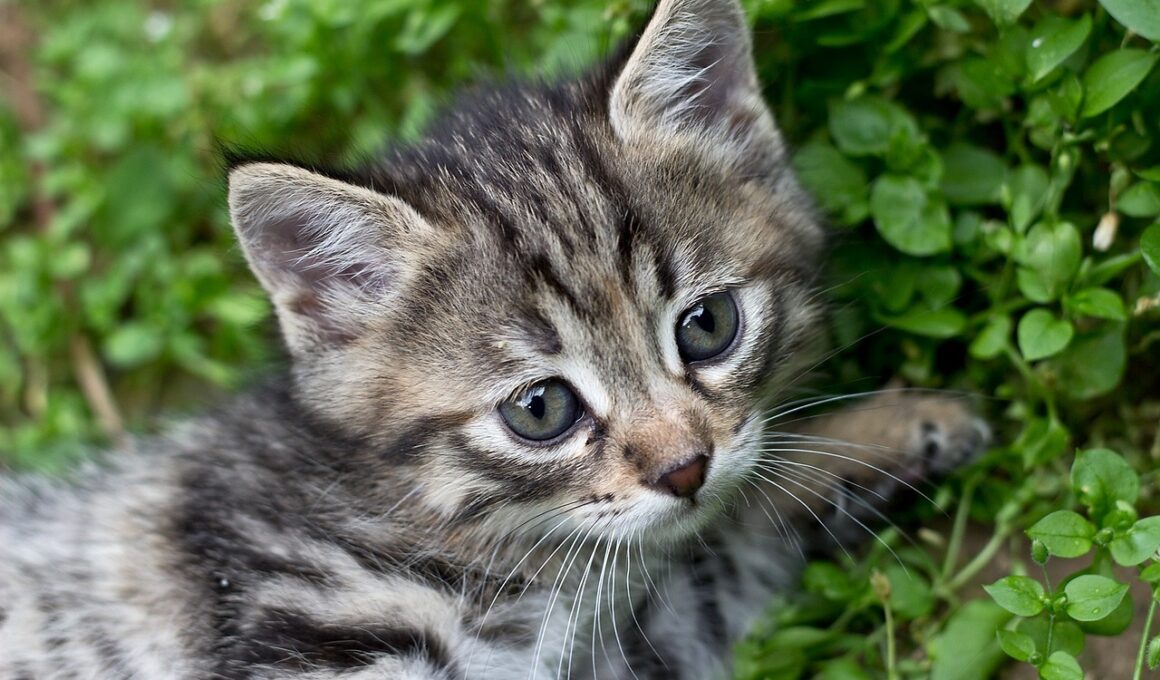How Cat Rescue Can Help Combat Loneliness and Stress
In today’s fast-paced world, many people experience heightened feelings of loneliness and stress. Cats, as affectionate companions, can offer emotional support to individuals seeking comfort. Engaging in cat rescue not only benefits these furry friends but also enhances one’s mental health. Involving oneself in rescuing cats provides a purposeful activity that diverts attention from personal challenges. This distraction can be remarkably therapeutic, allowing rescuers to focus on giving love and care. Furthermore, the unconditional love that cats offer can help alleviate feelings of isolation and anxiety. Caring for a rescued cat fosters a sense of responsibility, enhancing emotional connections, which leads to improved mental well-being. When individuals regularly interact with these animals, it triggers positive hormonal changes that reduce stress levels. Building such connections also encourages the development of routine and structure in life, which are essential for combating loneliness. In addition, bringing joy into a home through cat companionship creates a fulfilling environment. Rescuing a cat not only prevents its suffering but also enriches the lives of those who take part in the act. Companionship from a cat can significantly uplift one’s spirit and mood.
The tasks involved in cat rescue, such as feeding, grooming, and providing veterinary care, can significantly boost one’s self-esteem. This commitment to their welfare fosters feelings of accomplishment as individuals witness the positive transformation in these animals. Through nurturing and caring for a cat in need, rescuers often discover feelings of purpose and fulfillment that had previously been absent in their lives. Moreover, the bonds formed with these animals can transcend mere companionship. They provide an avenue for emotional expression and dialogue, enabling individuals to articulate their thoughts and feelings more freely. This sometimes leads to the discovery that others share similar sentiments, reducing the sense of being alone. Participation in cat rescue initiatives also allows individuals to connect with like-minded people. These relationships can form a supportive community, further alleviating feelings of loneliness. The networks established offer a vital resource for sharing experiences and coping strategies. When cat rescue becomes a shared activity, it deepens relationships between friends and family. In essence, fostering such connections through shared love for rescued cats contributes to a stronger sense of belonging, which is an integral part of mental wellness.
Cats as Emotional Support Animals
Cats are often seen as independent creatures, but they can provide immense emotional comfort. Spending quality time with cats leads to an increase in oxytocin, the hormone responsible for feelings of love and bonding. This natural interaction reduces cortisol levels, which is the stress hormone, enhancing overall well-being. Owning a rescued cat influences daily routines positively, providing structure and helping combat feelings of anxiety. The simple act of petting a cat fosters a calming environment that can soothe racing thoughts. Observing a cat’s playful antics can also bring laughter and joy into one’s life. Rescued cats, having been through challenging times themselves, often express gratitude in ways that deeply resonate with their caregivers. Creating a safe space for a cat to thrive fosters a sense of achievement and fulfillment. In return, rescuers often benefit from the therapeutic aspects of such interactions. The loyalty of a cat fosters a unique bond that goes beyond mere ownership. This connection holds the potential to transform life perspectives, encouraging optimism and reducing depressive feelings.
Moreover, the physical aspects of caring for a cat can encourage a healthier lifestyle. Rescuing a cat often involves regular activities such as feeding, grooming, and even engaging in playtime. These tasks promote physical movement, which is vital for maintaining mental health. Routine exercise, regardless of its nature, releases endorphins that enhance mood and relieve stress. Having a cat encourages individuals to go for walks, fostering both social interaction and physical activity. These outings not only benefit the cat but also provide opportunities for interaction with other pet owners, thus expanding social networks. Regular engagement in outdoor activities can break the cycle of isolation many experience, instilling a sense of adventure and purpose. Furthermore, caring for a cat develops empathy and compassion, traits that significantly contribute to improved mental health. This consistent approach to care nurtures a bond that enriches both lives involved, resulting in mutual emotional benefits. Overall, the multifaceted relationship between a rescuer and a cat enhances mental clarity and emotional strength, ultimately leading to a happier life.
The Ripple Effect of Cat Rescue on Communities
The influence of cat rescue extends beyond individuals to encompass communities. Local shelters and rescue organizations thrive on volunteer support and foster homes, creating a network of compassionate individuals focused on a common cause. This collaboration fosters social bonds, enhancing community engagement and connectedness. By participating in cat rescue initiatives, individuals often witness a collective effort to combat the issues of overpopulation and abandonment in shelters. Such movements inspire others to consider adoption over purchasing pets, promoting a culture of compassion. Adopting a cat not only frees up shelter resources but also encourages awareness of broader issues such as pet health and welfare. These community efforts help strengthen connections among residents, creating a support system that reduces feelings of isolation. Events focused on raising awareness and funds for cat rescue foster a sense of camaraderie, allowing participants to share stories and experiences. Engaging in these activities enhances social skills and creates opportunities for collaboration. The ripple effect created through collective cat rescue efforts reflects the essential role of community in combating loneliness and stress.
Additionally, the act of volunteering in cat rescue provides practical skills and learning experiences. Methods of care and handling in relation to animal welfare become invaluable tools that transform personal lives. Engaging in educational workshops or training sessions boosts confidence and knowledge. This knowledge can empower volunteers to educate others about responsible pet ownership. In turn, sharing these insights can foster a more compassionate community that resonates with the values of kindness and empathy. The rewards of volunteering are immense; the skills acquired can lead to multiple avenues of personal and professional growth. For those grappling with loneliness, engaging with others in such endeavors provides an opportunity to forge meaningful relationships. As volunteers succeed in their missions, the resultant triumphs can invigorate their sense of purpose in life. This sense of community ultimately cultivates optimism and resilience as individuals become more engaged in the world around them. The interconnectedness forged through volunteering in cat rescue directly serves to uphold mental health and well-being.
Conclusion: Embracing the Healing Power of Cats
In conclusion, the impact of cat rescue cannot be underestimated when it comes to coping with loneliness and stress. Cats serve as bridges connecting individuals to their emotions and fostering deeper relationships with themselves and others. The simple act of rescuing an animal transforms lives, imbuing meaning and spirit into everyday existence. Not only do cat rescues provide a safe haven for animals, but they also enhance the quality of life for their rescuers. This mutual exchange of love encapsulates the essence of companionship. Nurturing and caring for rescued cats serves as a reminder of the healing power that comes from unconditional love. For many, the bond formed with a cat may be the substance that promotes recovery from mental health challenges. As society becomes increasingly aware of mental health issues, integrating animal rescue into rehabilitation practices can yield profound benefits. Recognizing cats as partners in promoting wellness offers a new perspective on the importance of animal companionship. Ultimately, embracing the spirit of rescue affirms the belief that connection, companionship, and care can indeed change lives for the better.
In this light, becoming involved in cat rescue projects not only improves the state of abandoned animals but also enriches personal well-being. Engaging with shelter activities gives a sense of belonging and purpose. The nurturing, compassionate environment created through cat rescue promotes collective mental health, serving as a sanctuary for both cats and humans. Through shared stories and experiences, rescuer communities develop unique bonds that combat feelings of isolation. Individuals utilizing their time to provide love and care flourish emotionally. Cats, in their quirky, lovable ways may help uncover the true potential of those who care for them. As the connection deepens, so does the understanding of personal needs and emotions. The pathways formed through caring for a rescue cat highlight the importance of compassion and empathy in community dynamics. As cat rescues thrive, so too do the mental health benefits they provide. Society stands to gain significantly from embracing this relationship between alumni cats and humans. Ultimately, cat rescue serves not only as a means to save lives but also as a catalyst for positive change in the world.





